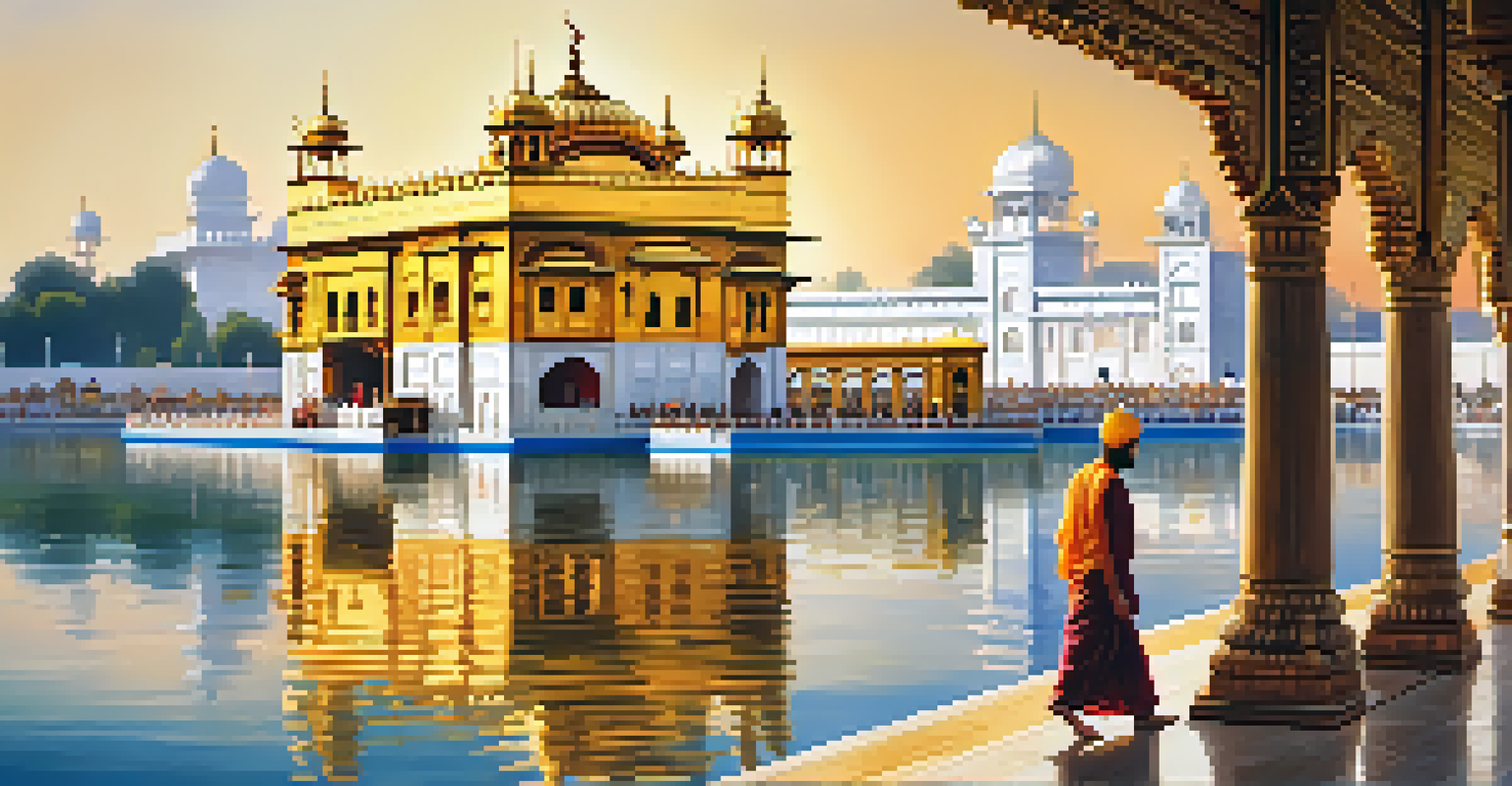Mystical Pilgrimages: Journey to India’s Spiritual Heart

Understanding the Essence of Pilgrimage in India
Pilgrimage in India is more than just a journey; it’s a profound exploration of spirituality. It connects individuals to their roots and offers a chance to reflect and rejuvenate. Many believe that these sacred travels can lead to self-discovery and enlightenment, making the experience deeply personal.
The pilgrimage is a journey of the heart, a quest for deeper understanding and connection.
From the majestic Himalayas to the serene banks of the Ganges, each pilgrimage site has its own unique significance. These places are often steeped in myth and legend, creating an atmosphere of reverence and awe. When pilgrims walk the paths taken by saints and sages, they feel a connection to something far greater than themselves.
Ultimately, embarking on a pilgrimage is about seeking a deeper understanding of oneself and the universe. It’s an invitation to step away from the chaos of daily life and immerse in spiritual contemplation. This journey can be transformative, often leading to lasting changes in one's perspective and purpose.
Top Spiritual Destinations for Pilgrims
India offers a multitude of spiritual destinations that attract pilgrims from around the world. Varanasi, known as the spiritual capital, draws visitors with its ancient ghats and vibrant rituals along the Ganges River. Walking through the narrow lanes of this city, filled with temples and shrines, immerses one in a rich tapestry of culture and devotion.

Another significant site is Rishikesh, often referred to as the 'Yoga Capital of the World.' Nestled in the foothills of the Himalayas, Rishikesh is famous for its ashrams and meditation retreats. The serene environment along the Ganges makes it an ideal place for reflection and spiritual awakening.
Pilgrimage: A Journey of Self-Discovery
Embarking on a pilgrimage allows individuals to explore their spirituality and gain profound insights about themselves.
Lastly, the city of Amritsar is home to the Golden Temple, a stunning symbol of peace and harmony. This sacred site welcomes people of all faiths, offering a unique experience where spirituality transcends boundaries. Pilgrims leave with a sense of unity and a deeper appreciation for humanity.
The Role of Rituals in Pilgrimage
Rituals play a crucial role in the pilgrimage experience, providing structure and meaning to the journey. From bathing in holy waters to participating in prayer ceremonies, these rituals connect pilgrims to the divine. Each act is infused with significance, often reflecting centuries of tradition and devotion.
Nature is not a place to visit. It is home.
For many, the act of performing rituals can evoke powerful emotions and a sense of belonging. Engaging in these practices fosters community among pilgrims, creating bonds that often last beyond the journey itself. Sharing moments of prayer and reflection can lead to profound insights and shared experiences.
Moreover, rituals serve as reminders of one's spiritual intentions. They help individuals focus on their goals and aspirations, reinforcing the purpose behind their pilgrimage. This intentionality can lead to personal revelations, making the journey not just physical, but deeply transformative.
The Spiritual Significance of Nature in Pilgrimages
Nature often plays a vital role in the pilgrimage experience, enhancing the spiritual journey. Many sacred sites are located in breathtaking landscapes, from the towering peaks of the Himalayas to the lush greenery of Kerala. These natural settings provide a serene backdrop for introspection and connection with the divine.
The act of walking through nature can evoke a sense of wonder and peace, allowing pilgrims to feel more attuned to their surroundings. As they traverse rivers, mountains, and forests, the beauty of the landscape can inspire a deeper appreciation for life and spirituality. It’s as if nature itself becomes a part of the pilgrimage.
Nature Enhances Spiritual Experiences
The breathtaking landscapes surrounding pilgrimage sites foster a deeper connection with the divine and promote introspection.
Additionally, many spiritual traditions emphasize the importance of nature in fostering a connection with the divine. Whether it's the sound of flowing water or the sight of a stunning sunset, these elements can evoke feelings of gratitude and reverence. Pilgrims often leave with a newfound respect for the environment and its role in their spiritual journeys.
Personal Transformations Through Pilgrimage
Many pilgrims report significant personal transformations resulting from their journeys. The physical act of traveling to sacred sites often mirrors an internal journey of self-discovery. As individuals confront challenges along the way, they learn resilience and gain new perspectives on life.
Through rituals, meditation, and connection with fellow pilgrims, individuals often experience a shift in consciousness. This journey fosters a sense of clarity and purpose, helping them to realign with their core values. As they return home, many feel a renewed sense of motivation and direction.
Moreover, these transformations can lead to lasting changes in behavior and mindset. Pilgrimage often encourages individuals to live more mindfully and compassionately. The insights gained during this spiritual journey can inspire a lifelong commitment to personal growth and spiritual exploration.
Preparing for Your Pilgrimage Journey
Preparation is key to ensuring a fulfilling pilgrimage experience. Researching the destination, understanding its customs, and familiarizing oneself with local practices can enhance the journey. Knowing what to expect helps pilgrims approach their travels with an open heart and mind.
Physical preparation is equally important, as many pilgrimage routes require a certain level of fitness. Engaging in regular exercise, practicing meditation, and preparing mentally can set the tone for a successful journey. It’s essential to listen to one’s body and be mindful of personal limits.
Community Bonds Through Shared Journeys
Pilgrimage creates a sense of belonging among travelers, forming lasting friendships and a supportive spiritual community.
Lastly, packing thoughtfully can make a significant difference. Comfortable clothing, essential supplies, and items for personal reflection, such as journals or prayer beads, can enrich the experience. By being well-prepared, pilgrims can fully immerse themselves in the journey and its spiritual significance.
The Community Aspect of Pilgrimages
One of the most enriching aspects of pilgrimage is the sense of community it fosters. Pilgrims often find themselves forming connections with fellow travelers who share similar spiritual goals. These bonds can lead to lifelong friendships and a support network that extends beyond the pilgrimage itself.
Sharing stories, experiences, and even moments of vulnerability can create a strong sense of belonging. This communal aspect of pilgrimage often enhances the spiritual experience, as individuals encourage and uplift each other along the way. It’s a reminder that spirituality can be a shared journey.

Furthermore, many pilgrimages include opportunities for group rituals and activities, which can deepen the sense of connection. Whether it’s chanting, meditating, or sharing meals, these collective experiences create a tapestry of shared spirituality. Pilgrims often leave with not only personal insights but also cherished memories of the community they built along the way.